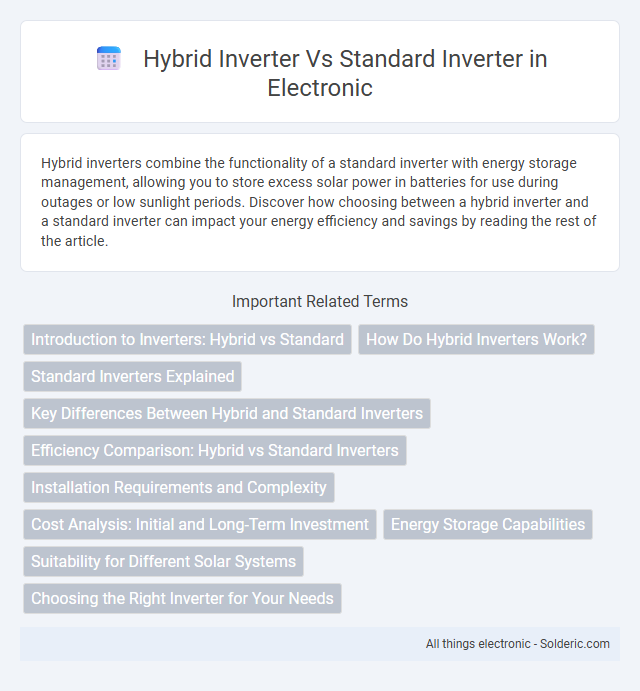Hybrid inverters combine the functionality of a standard inverter with energy storage management, allowing you to store excess solar power in batteries for use during outages or low sunlight periods. Discover how choosing between a hybrid inverter and a standard inverter can impact your energy efficiency and savings by reading the rest of the article.
Comparison Table
| Feature | Hybrid Inverter | Standard Inverter |
|---|---|---|
| Energy Source | Solar panels + Battery + Grid | Solar panels + Grid |
| Battery Integration | Built-in battery management | Not supported |
| Energy Storage | Supports storing excess solar energy | No energy storage capability |
| Grid Independence | Can operate off-grid during outages | Depends fully on grid |
| Cost | Higher initial cost | Lower initial cost |
| Installation Complexity | More complex wiring and setup | Simpler installation process |
| Energy Efficiency | Higher efficiency due to battery use | Lower efficiency without storage |
| Optimal Use Case | Residential/commercial with energy storage needs | Basic solar setups without storage |
Introduction to Inverters: Hybrid vs Standard
Hybrid inverters integrate solar energy management with battery storage systems, optimizing energy use by automatically switching between grid power, solar panels, and batteries. Standard inverters convert DC power from solar panels into AC power for your home but lack built-in energy storage control. Choosing a hybrid inverter enhances energy efficiency and reliability by maximizing self-consumption and backup power during outages.
How Do Hybrid Inverters Work?
Hybrid inverters function by managing multiple power sources, typically combining solar energy, battery storage, and grid electricity to optimize energy usage and backup supply. They convert direct current (DC) from solar panels or batteries into alternating current (AC) for home use while intelligently switching between sources based on availability and demand. Your energy system benefits from increased efficiency and reliability, reducing reliance on the grid and maximizing renewable energy utilization.
Standard Inverters Explained
Standard inverters convert direct current (DC) from solar panels into alternating current (AC) for household use but lack battery integration, limiting energy storage capabilities. Their efficiency typically ranges between 90-98%, suitable for grid-tied solar systems without backup power needs. Unlike hybrid inverters, standard inverters cannot manage energy flow from batteries, reducing flexibility during power outages or peak demand periods.
Key Differences Between Hybrid and Standard Inverters
Hybrid inverters integrate solar energy management with battery storage capabilities, enabling efficient energy use and backup power during outages. Standard inverters convert direct current (DC) from solar panels to alternating current (AC) without battery integration, limiting energy storage options. Your choice depends on the need for energy independence and backup power versus basic solar power conversion.
Efficiency Comparison: Hybrid vs Standard Inverters
Hybrid inverters typically offer higher efficiency compared to standard inverters by integrating both solar energy conversion and battery storage management in a single unit, reducing energy losses. Standard inverters primarily convert DC to AC power without energy storage capabilities, resulting in limited efficiency during energy fluctuations or outages. The advanced technology in hybrid inverters leads to better energy utilization and increased overall system performance.
Installation Requirements and Complexity
Hybrid inverters require more complex installation due to their ability to manage both solar panels and battery storage systems, demanding professional expertise to ensure proper integration and safety. Standard inverters have simpler installation processes since they only convert DC from solar panels to AC for immediate use or grid export without battery management. Your choice impacts installation time and cost, with hybrid setups generally needing more careful planning and specialized equipment.
Cost Analysis: Initial and Long-Term Investment
Hybrid inverters generally have a higher initial cost compared to standard inverters due to their advanced technology supporting both solar panel integration and battery storage. Over the long term, hybrid inverters can offer greater savings by maximizing energy efficiency and enabling energy storage, reducing reliance on grid electricity. Your investment decision should weigh the upfront expense against potential energy cost reductions and increased system flexibility.
Energy Storage Capabilities
Hybrid inverters integrate energy storage capabilities by managing both solar power generation and battery storage systems, allowing for efficient energy use and backup power during outages. Standard inverters convert DC to AC power from solar panels but lack built-in energy storage management, requiring separate components for battery integration. The hybrid inverter's ability to seamlessly switch between grid, solar, and battery power optimizes energy consumption and maximizes self-consumption of stored solar energy.
Suitability for Different Solar Systems
Hybrid inverters are ideal for solar systems that combine grid power, solar panels, and battery storage, providing seamless energy management and backup during outages. Standard inverters suit simpler setups where energy is directly converted from solar panels to usable AC power without battery integration. Choosing the right inverter depends on system complexity, such as hybrid inverters enhancing off-grid or mixed energy applications while standard inverters fit grid-tied solar installations.
Choosing the Right Inverter for Your Needs
Hybrid inverters combine solar energy conversion with battery storage management, enabling efficient energy use and backup during outages, while standard inverters solely convert DC to AC power without energy storage capabilities. Your choice depends on factors like energy independence goals, budget, and desired system complexity--hybrid inverters suit those seeking autonomy and resilience, whereas standard inverters are ideal for straightforward solar setups. Evaluating electricity usage patterns, future expansion plans, and local utility policies helps determine the best inverter type for your solar energy system.
Hybrid Inverter vs Standard Inverter Infographic

 solderic.com
solderic.com